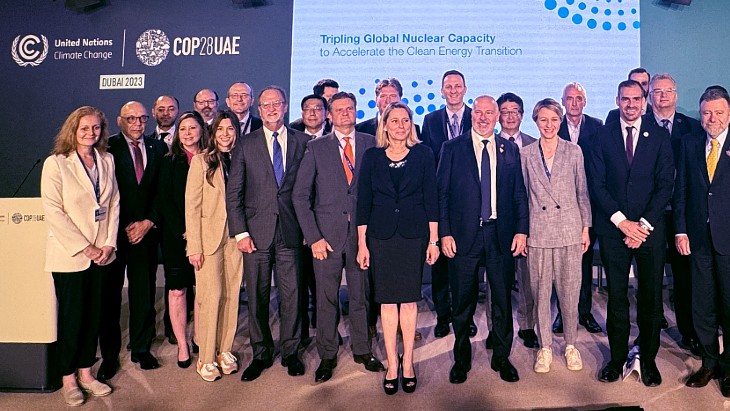The companies signing up to the pledge operate in more than 140 countries and have now committed to supporting the same large-scale expansion of nuclear energy as the governments of 24 countries who have backed a Ministerial Declaration with a similar 2050 goal.
Sama Bilbao y León, Director General of World Nuclear Association, which represents the nuclear industry worldwide, said: "Nothing less than this ambitious, but achievable, target will be enough to deliver the scale of contribution needed from nuclear energy to achieve sustainable economic development, and avert the devastating consequences of unchecked climate change."
The Net Zero Nuclear Industry Pledge notes "that since 2000, nuclear generation has supplied, on average, 2500 TWh of electricity each year, and that, worldwide, nuclear reactors now supply around 10% of the world’s electricity, and around one-quarter of all clean, low-carbon electricity" and also that the International Atomic Energy Agency forecasts a substantial increase in electricity demand by 2050.
It says that "all available low-emission technologies, including nuclear, should be recognised and actively supported to achieve sustainable economic development and avert the devastating consequences of unchecked climate change" and recognises that governments, by their policies and by ensuring access to financing for nuclear on equal terms to other clean energy sources, "can enable nuclear capacity deployment at scale worldwide".
It notes that it will be the nuclear industry that will be responsible for the implementation of such policy objectives and, among their pledges, those signing it:
- Believe that nuclear energy capacity has to grow at a faster rate than the increase in global electricity demand
- That capacity should at least triple by 2050 to help achieve goals for decarbonisation and enhanced energy resilience and security
- Commit to mobilise and/or support investments in nuclear power, including through innovative financing mechanisms
- Will work with "governments, regulators, and other stakeholders to maximise the contribution from existing operating nuclear power plants and accelerate the pace of new nuclear deployment in a safe, responsible and secure manner"
- Thank the governments who have signed the Ministerial Declaration and "Commit to supporting governments in implementing the nuclear policy objectives that will help meet the targets and goals set out in the pledges today"
Click here to see the Net Zero Nuclear Industry Pledge in full, and the list of signatories
Bilbao y León said: "It is now time to move forward: let's translate ambition into pragmatic policies, good intentions into affordable financing, and deadlines into on-time on-budget delivery of new nuclear energy projects."
Maria Korsnick, President and CEO of the Nuclear Energy Institute in the USA, said there had been a sea-change for nuclear energy, noting that it not only brings carbon-free energy, but also high reliability, jobs and energy security and said that nuclear energy was one area of bipartisan agreement in the USA.
She added, however, that despite the current positive environment for nuclear it "doesn't mean it's going to be easy", with challenges in areas such as ensuring supply chains and workforce for the expansion "but it is all doable if we all work together".
John Gorman from the Canadian Nuclear Association said there had been "remarkable progress" over the past three years "with the momentum that is happening around the world in terms of his pragmatic recognition that this is about math, it's about physics, it's not about theology of some sort ... we understand that doubling or tripling the amount of clean electricity that is produced is going to be a very significant challenge".
Akihito Uetake, senior managing director of the Japan Atomic Industrial Forum, said that a "sincere commitment to safety forms the foundation for the revival for nuclear power in Japan and also the world" over recent years and said that "we are striving to build innovative new reactors, including advanced large light-water reactors, SMRs, sodium-cooled fast reactors, high-temperature gas-cooled reactors and fusion reactors. These activities will be carried out in close collaboration with many countries and I firmly believe this will significantly contribute to the tripling of the world's nuclear power capacity."
Yves Desbazeille, director general of nucleareurope, said: "COP28 is a momentous occasion for nuclear. For the first time in decades, Member States have joined forces to underline the need for nuclear as a clean source of energy capable of ensuring security of supply. This call for a tripling in global nuclear capacity goes hand in hand with the target of 150 GW of nuclear capacity in the EU by 2050 set by the Nuclear Alliance back in May."
Tom Greatrex, chief executive of the UK's Nuclear Industry Association, said: "This pledge from industry shows it is ready to build out nuclear power at scale and pace to hit net-zero and secure future energy systems. Governments are committed to ramping up nuclear and we stand ready to help deliver this vital target ... I look forward to seeing the UK’s plan to triple capacity in the Nuclear Roadmap in the new year."
COP28 - which stands for the 28th Conference of the Parties to the original 1992 United Nations Framework Convention on Climate Change - is being held in Dubai in the UAE from 30 November until 12 December. Representatives of nearly 200 governments are attending and the aim is to continue efforts to limit the global rise in temperatures to 1.5 degrees celsius above pre-industrial levels.







_55401.png)
_23009.jpg)






